Global Basic Income Explorer February 2024 update
Jessica Chew | Fri Mar 01 2024
I am pleased to release the latest update of the Global Basic Income Explorer which aims to provide a broad update of basic income activities around the world.
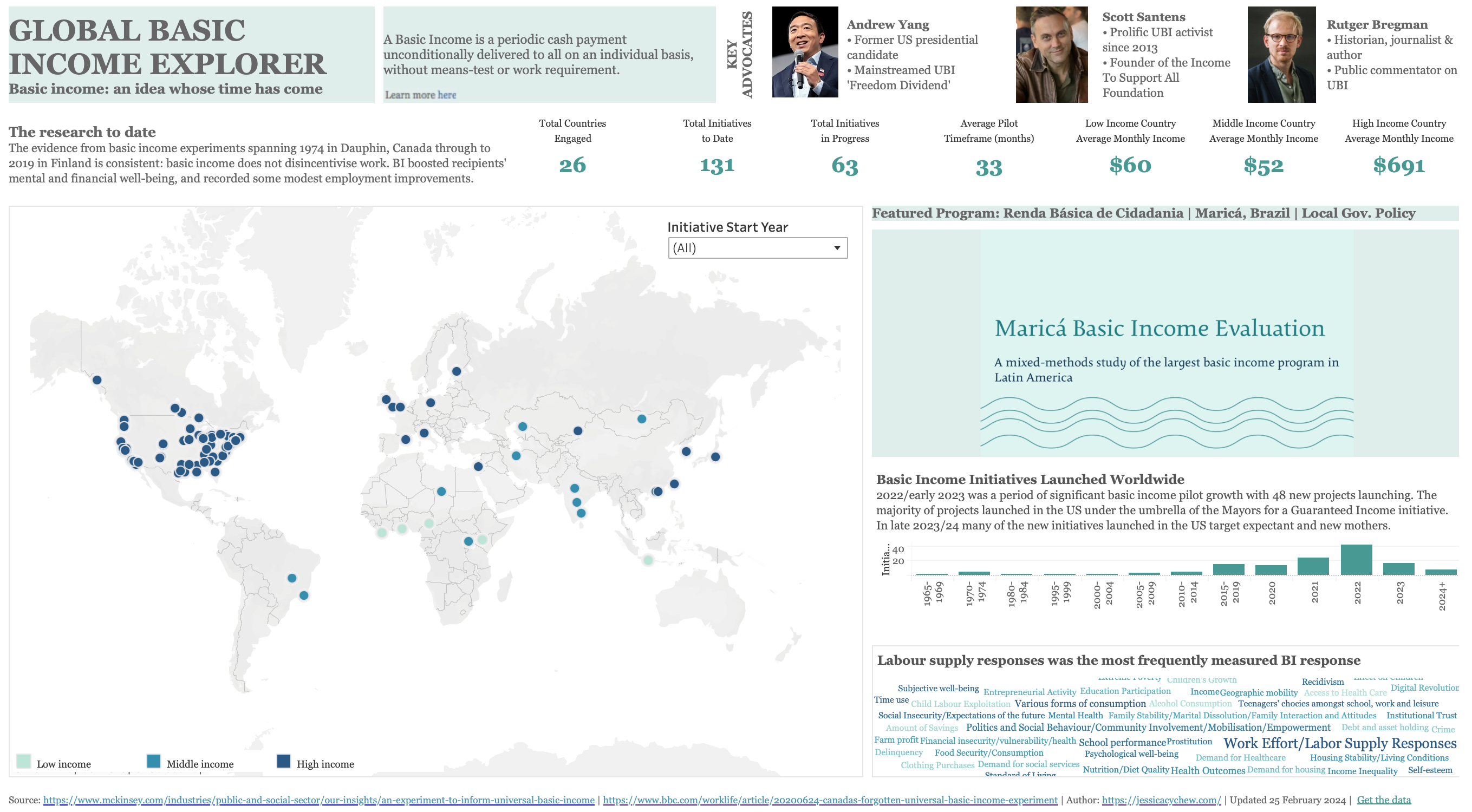
This update, covering May 2023 – February 2024, unearths three major themes.
1. Slowdown in new basic income pilot launches
2. Next wave of US basic income pilots targets expectant and new mothers
3. Post-pilot thinking: Moving from successful trials to policy
1 | Slowdown in new basic income pilot launches
In 2023 and early 2024 approximately 30 basic income initiatives launched across the US, UK, India and Taiwan, which is down from a 66-initiative high between 2021-2022.

Most basic income initiatives emerged in the US through small-scale city and county level trials that were partly funded by the US$350B American Rescue Plan Act (2021) COVID-19 stimulus package . State, local and tribal governments must ‘obligate’ the funds by 2024 and spend their allocations by 2026. The cluster of pilot launches around 2021 and 2022 demonstrate a period of rapid basic income program development to disseminate support to American communities in the wake of the pandemic.
2 | Next wave of US basic income pilots targets expectant and new mothers
Baby’s First Yearsis a ground-breaking US study that assesses the impact of poverty reduction on family life and infant and toddlers’ cognitive, emotional, and brain development. In 2022 the interdisciplinary research team across neuroscience, economics, psychology, and social policy concluded:
“…an anti-poverty intervention had a direct impact on children’s brain development . After one year, infants of mothers in low-income households receiving $333 in monthly cash support were more likely to show faster brain activity, in a pattern associated with learning and development at later ages.”
In response, the 2023-2024 wave of US basic income pilots shifted focus from emergency income disbursement to proactive studies on the impact of cash transfers on expectant and new mothers in poverty and their babies.
Key projects include:
- RxKids basic income in Flint, Michigan USA disbursing US$1,500 during pregnancy and $500 each month throughout the baby’s first year to 1,200 expectant and new mothers per year;
- The Humboldt Income Program in McKinleyville, California USA disbursing US$920 per month for 18 months to 150 pregnant people;
- Mothers Rising for Guaranteed Basic Income in Los Angeles, California USA disbursing US$500 per month to 100 expectant and new mothers for two years.
These pilots operate against the broader backdrop of the US recognising the positive power of cash to improve children’s lives. In January 2024 with bipartisan support the House approved the expansion of the annual Child Tax Credit from $2,000 per child to $3,000 per child for children over the age of six and from $2,000 to $3,600 for children under the age of six, and raised the age limit from 16 to 17.
Despite the slower rate of basic income pilot growth, it is still great to see new initiatives being launched rapidly in response to the important Baby’s First Yearsresearch study. I recognise that these pilots are targeted to vulnerable populations that research suggests will experience outsized benefit from unconditional cash transfers.
Ultimately, I am glad that the unconditionality agenda in welfare support is advancing through evidence-based and politically viable targeted initiatives such as basic income for new mothers. In time, I hope that these unconditional pilots graduate to permanent programs and pave the path to universality in basic income.
3 | Post-pilot thinking: Moving from successful trials to policy
UBI academic and advocate Guy Standing’s recent essay title summarises this theme well - “Basic Income: Sufficient Evidence, Now Politics”.
There are an estimated 130-200 basic income trials around the world that are either in progress or completed. UBI advocate Scott Santens drives home Guy Standing’s point succinctly:
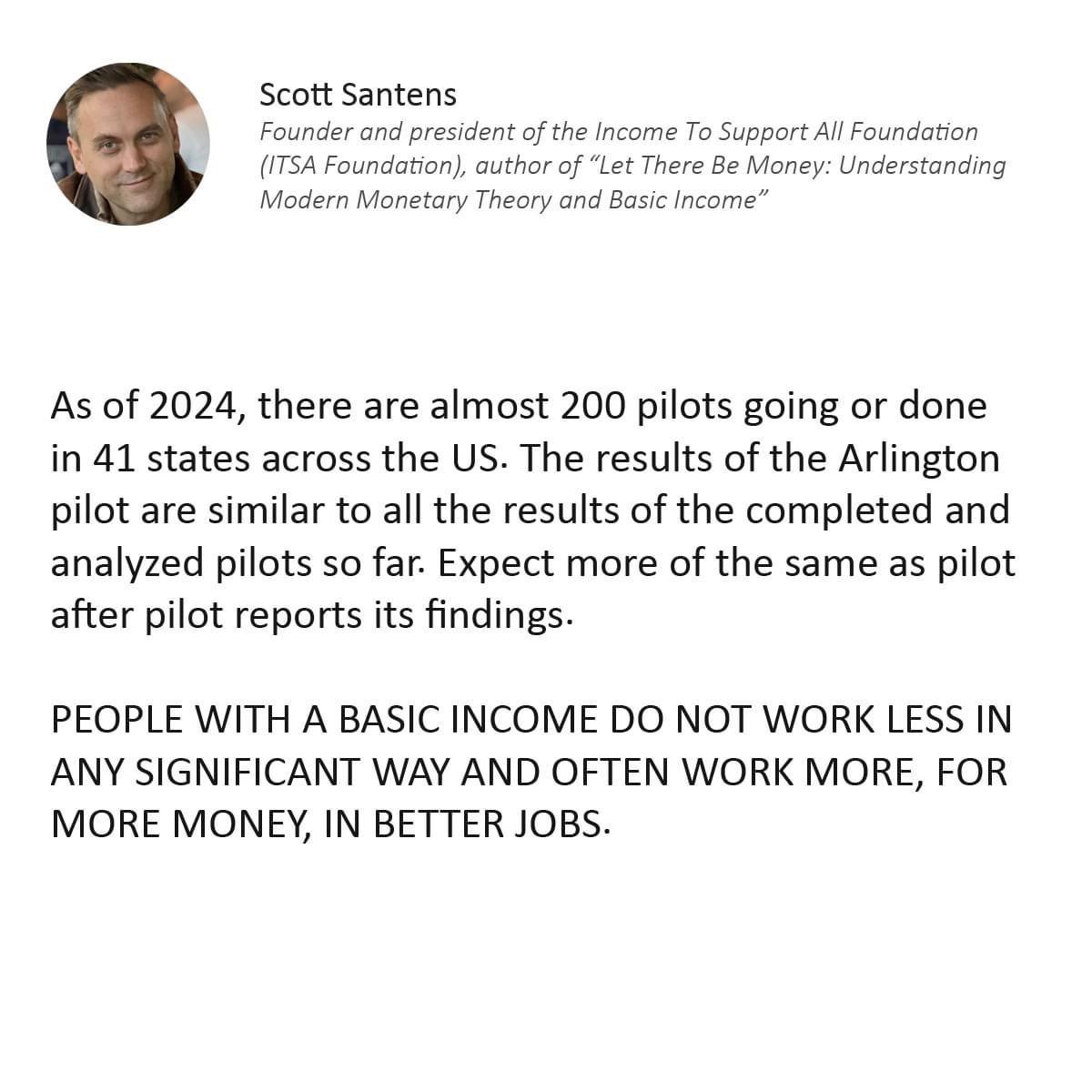
Some pro-UBI leaders such as Boston, Massachusetts USA Mayor Michelle Wu are taking heed and shifting the conversation from pilots to practical implementation. She states:
“What I have been struggling with when it comes to universal basic income is not the concept or the effectiveness of it, but how at the local level do we get to the scale where it can be sustainable and impact more than just a pilot program of say, 20 families or even 100 families.” – News From the States
In response, I would like to highlight two international policy initiatives that address Mayor Wu’s question.
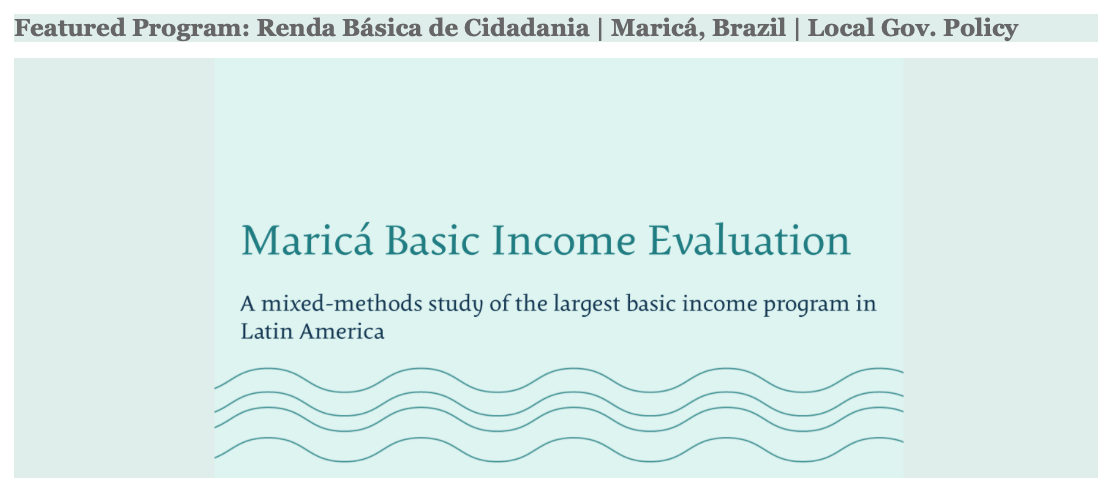
Apart from the oft-cited Alaska Permanent Fund as an example of a UBI-like program in practice, this update features Renda Básica de Cidadania , a local government basic income program in the Brazillian city of Maricá. It provides a US$39 per month basic income to approximately a 42,000 people, or a quarter of the city’s population. This basic income is paid in mumbuca, the city’s local digital currency. Similarly to the Alaska Permanent Fund, Maricá’s program is funded by a sovereign wealth fund that is capitalised by oil royalties and intends to guarantee basic income funding into perpetuity.
Crossing over to South Korea, in July 2022 the Mayor of Seoul Oh Se-hoon launched the ‘ Seoul Safety Income Project’ (SSIP), a pilot that provides financial assistance matching half of the difference between the median income and household income for low-income households in Seoul (median income: 85% or less; property: ?326 million/US$255 million or less). The project’s aim is to address income inequality and precarity in the South Korean economy.
South Korea is a basic income leader in the East Asia region. Support for UBI in the country is relatively high with 2022 Presidential candidate Lee Jae-myung only narrowly losing after campaigning on a UBI platform and having launched the 2019 Gyeonggi Youth Basic Income pilot in Seoul. Furthermore, details are currently emerging of a South Korean Basic Income for Farmers program . The SSIP pilot will run until June 2025 with impact analysis carried out through December 2026.
This post will conclude on some technical updates on the Universal Basic Income Explorer.
1. The dataset behind the dashboard is now available on GitHub.
2. Clicking on a time period in the ‘Basic Income Initiatives Launched Worldwide’ bar chart will dynamically filter the map by that same time period, including the summary statistics at the top of the page. Users can choose one or more time periods (by holding down the control button). This will aid users in understanding geographical clusters of projects over time.
Before
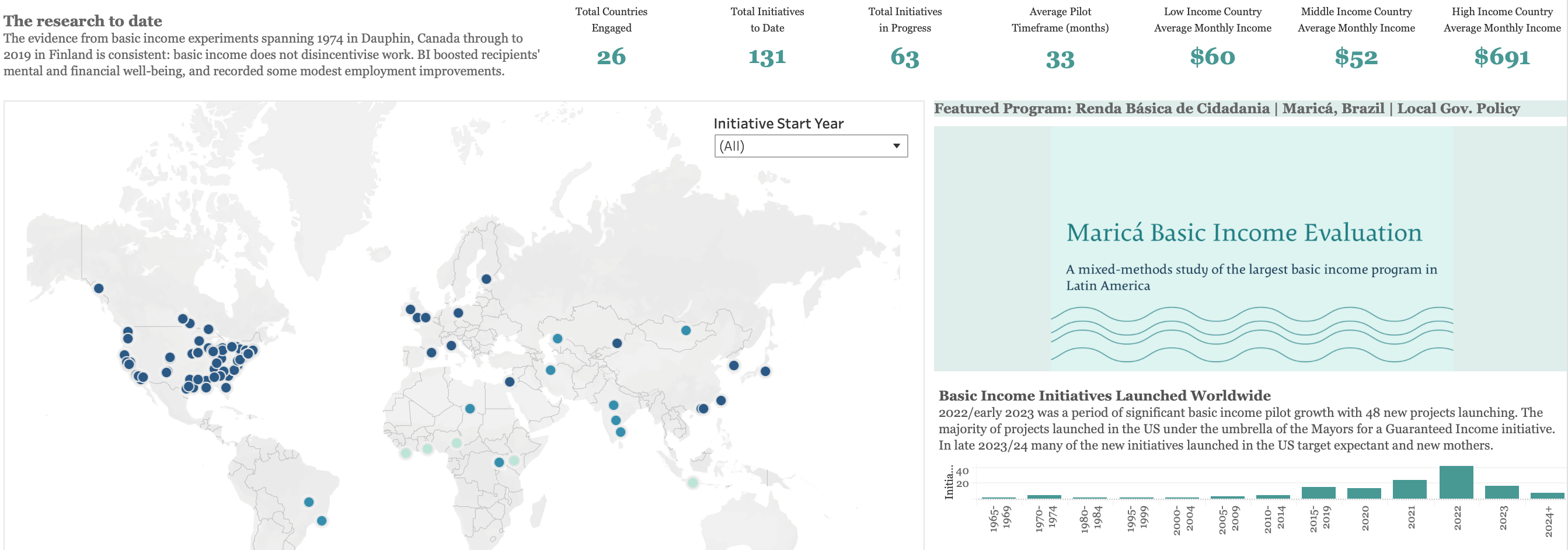
After
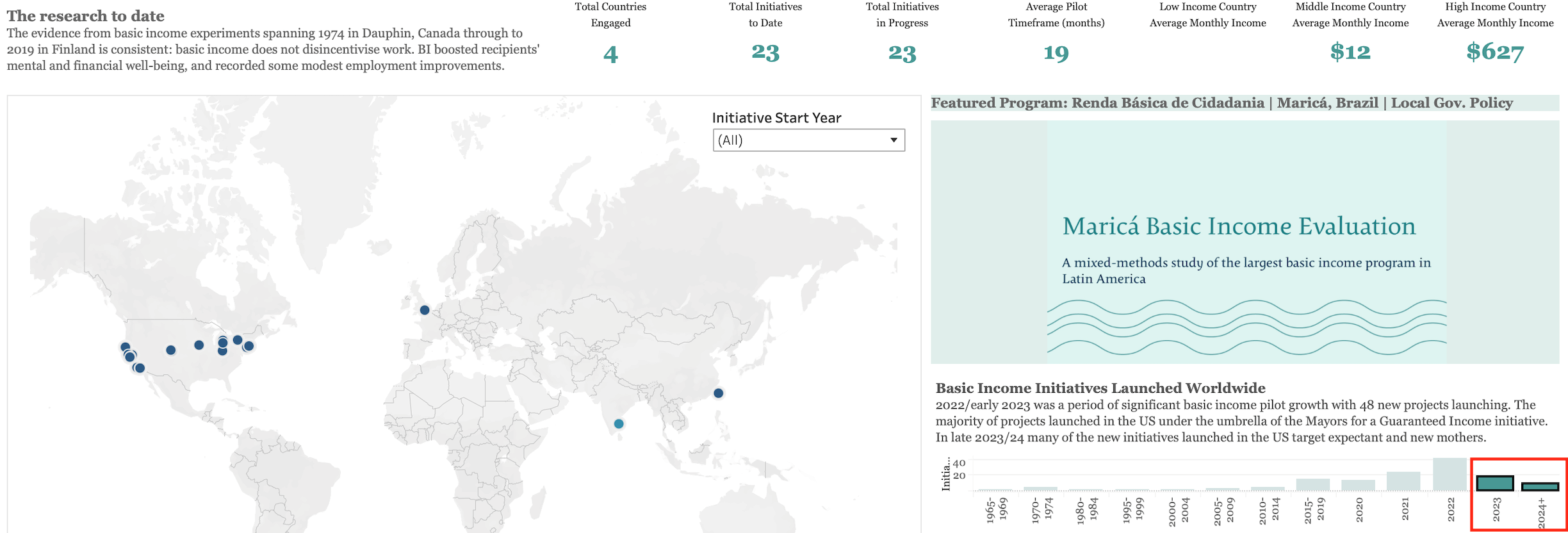
This blog was originally posted on the author’s website .